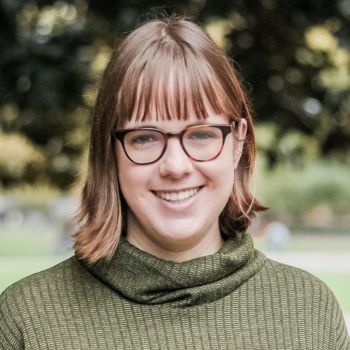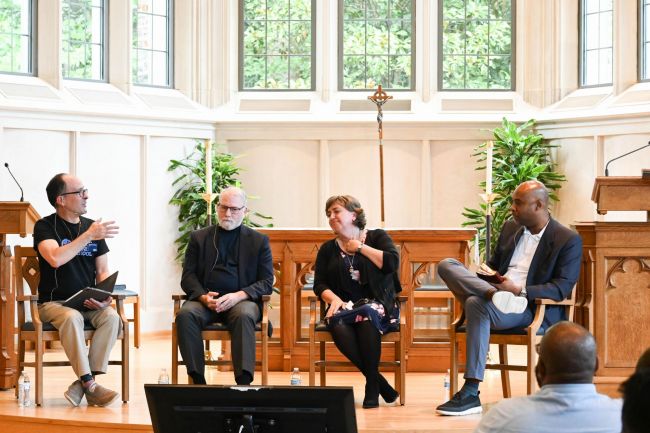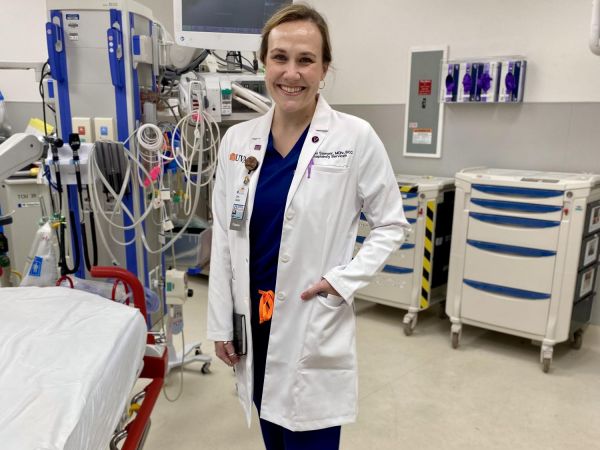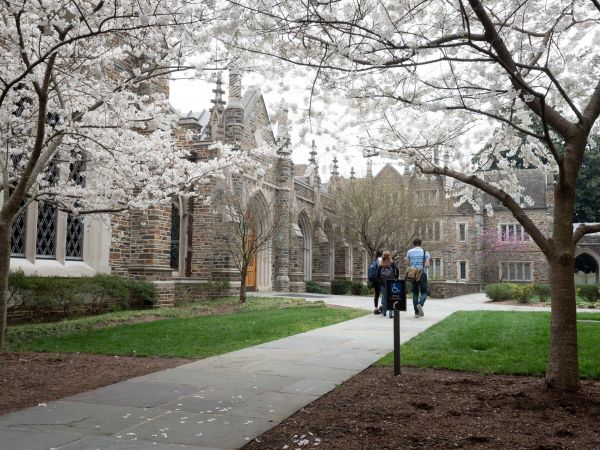The M.Div./M.S.W. degree is designed to prepare individuals for positions of leadership and service in the social agencies of the church and the community at large. The program equips graduates for various forms of ministry and service in which clinical and administrative skills in social work and theology are critical.
Two integrative seminars are taken in the first and final year of study. These seminars enable the student to integrate theological, biblical, theoretical, ethical, pastoral, social justice, empirical, and practical dimensions of social work.
The Master of Divinity/Master of Social Work program can be completed in four continuous years of full-time study. The dual degree leads to a Master of Divinity degree conferred by Duke University and a Master of Social Work degree conferred by the University of North Carolina at Chapel Hill.
View M.Div./M.S.W. program information on the University of North Carolina at Chapel Hill website.

"My interest is in mental health, and the Master of Social Work will allow me to pursue counseling as a Licensed Clinical Social Worker. My hope is to practice counseling and therapy with the ability to be really mindful of my client’s spiritual backgrounds and spiritual needs. One of my biggest draws to Duke Divinity and the biggest reason that I appreciate the school is the interdisciplinary work that is constantly happening."

Top Tier Faculty
Our faculty are at the pinnacle of their fields of study, and their work is at the cutting edge of research. Students benefit by studying directly with academics who are not only the best at what they do but dedicated to the church and to nurturing the next generation of pastors, thinkers, and doers of theology.
Houses of Study
Our houses of study help prepare you for service—and ordination—in the communities and denominations where you’ll serve. They include the Methodist/Wesleyan House of Studies, the Baptist House of Studies, the Anglican Episcopal House of Studies, the Presbyterian/Reformed House of Studies, the Office of Black Church Studies, and the Hispanic House of Studies.
Curriculum
The curriculum for our flagship degree program is designed to give students a solid foundation for wherever their calling takes them—be that ordination, lay ministry, nonprofit work, or a career in teaching. Our classes cover Old and New Testament, church history, Christian theology, world Christianity, ministry, worship, preaching, biblical languages, the Black Church, and a variety of electives. The M.S.W. program at UNC–Chapel Hill is ranked as one of the best in the nation and develops foundations in social welfare policy and service, social research, and social work practice. The M.Div./M.S.W. dual degree program enables students to think critically about faith and social work and get practical experience in both disciplines.
The Robertson Scholars Program (RSX) bus can be used for free transportation between both schools.
Those interested in dual-degree programs are required to pursue admission to each school independently, and upon successful admission to both programs, are enrolled as dual-degree students.
The core curriculum of each degree must be completed at each institution. A customized course of study allows students to start the program at either school, with slightly different paradigms governing the course of study in each case. Newly matriculating full-time students complete the first two years of the program at the Divinity School.
In addition to tuition/fees for 8 semesters of study, there are additional tuition charges for classes taken at Duke Divinity in the final year of study at UNC that are typically prepaid during the first two years of the program at Duke. This pre-payment supports courses in the final two years as well as administration of the overall program, and these funds are not refundable if a student were to withdraw from the program.
Efficiency of the dual degree requires strict adherence to course sequence and the curriculum as designed. The program cannot be shortened significantly by taking courses in summer session at either school.
View more information and frequently asked questions about the program:
Spiritual Formation
We form students for ministry in a variety of ways—through coursework, corporate worship, field education, service opportunities, houses of study, and denominational associations. Each first-year M.Div. student will have multiple options for intentional formation that will complement your academic work and field education opportunities. Students receive support and mentoring for vocational discernment and spiritual direction.
Graduation Requirements
M.Div.
- 20 Divinity School courses/60 credit hours (this number is reduced as part of the dual degree status)
- Two integrative electives unique to M.Div./M.S.W. curriculum
- Five true M.Div. electives (only one for Methodists, who have at least four judicatory requirements)
- Core and elective requirements are the same as M.Div. requirements
- Student portfolios (middler review and senior portfolio)
- Two approved units of field education
M.S.W. (UNC–Chapel Hill)
- 50 credit hours (split between foundation and concentration credits)
- Select between two concentrations: Direct Practice or Community Practice
- Four semester-long courses of approved field education (begin in third year)
Certificates





An education from Duke Divinity School is worth your investment, and you do not have to figure out the finances alone.
All M.Div. students receive funding.
Duke Divinity School is investing in you, too. It is an investment in your education, the church, and our shared future. All M.Div. students receive some form of scholarship support from Duke Divinity School that will cover between 25% and 100% of tuition costs, and there is no separate application needed in order to be considered. The M.Div. program offers many fellowships that also provide tuition support. Many other internal and external scholarships, as well as federal financial aid in the form of work study and loans, make it possible for students to afford Duke Divinity. We are committed to ensuring that every student who hears the call to ministry can fund their education here. FAFSA should be completed for external aid. More information can be found in our Financial Aid section.
Paid Field Education Internships
Duke Divinity is unique in its ability to provide funding for up to three field education internships (two placements are required for graduation). The Office of Field Education pairs students with dynamic ministry contexts that can provide up to $10,000 per placement. This funding is in addition to any scholarships, grants, or outside aid that a student receives, and can result in as much as $40,000 in additional support throughout the course of the M.Div. program.


Lifelong Dividends
In addition to earning a degree from Duke Divinity School, you also receive benefits that continue to impact your life long after you leave. Space is given for learning timeless ministry skills, the cultivation of holy friendships that will sustain you, and faculty who are mentors as your vocation unfolds. The overwhelming majority of our students say their investment is worth it.
Ready for the Next Step?
Students interested in dual-degree programs are required to pursue admission to Duke Divinity and UNC School of Social Work independently, and upon successful admission to both programs, are enrolled as dual-degree students. Students who are enrolled in either program may apply to the dual degree program after they have started at either school. However, interested students should be aware that the annual application deadline for the M.S.W. at UNC is in mid-January.
Duke Divinity School accepts applications from students with a demonstrated commitment to some form of ordained or lay ministry and a minimum GPA of 2.75 in a bachelor’s degree from a regionally accredited college or university prior to the intended date of enrollment.
M.Div. Application Requirements
Apply to the M.S.W.
Visit the UNC–Chapel Hill School of Social Work website to learn more about UNC admissions. You will need to apply to UNC separately in order to enroll as a dual-degree student.
Request Info
Join our mailing list, and we'll send you more information.
Request Info about our programsVisit Campus
The best way to learn more about us is to visit. Schedule an in-person or online visit.
Visit Us
Learn More
You can contact the program director at the University of North Carolina School of Social Work directly: Dr. Travis Albritton, Program Coordinator Faculty Liaison: (919) 962-6432, travis_albritton@unc.edu.
The resources below will also help you learn more about our programs.
















